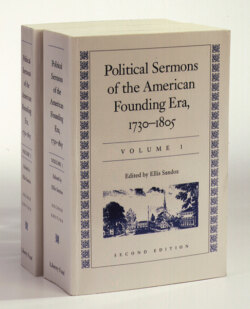Читать книгу Political Sermons of the American Founding Era: 1730–1805 - Группа авторов - Страница 37
На сайте Литреса книга снята с продажи.
ОглавлениеSAMUEL DUNBAR (1704–1783). After obtaining two degrees from Harvard College, in 1727 Dunbar settled, and was to remain, at the First Church in Stoughton, Massachusetts. An animated and forceful preacher, Dunbar was at odds with the revivalism of the Great Awakening and maintained the Calvinist orthodoxy of his mentor, Cotton Mather. “Inasmuch as he believed there was one, and only one, redeeming way to worship God, he preached outspokenly against Jewish dogma, Catholic grace, Antinomian morality, Arminian ecumenical salvation, and Deistic rationalism. In general, he preached against any organization that upheld free will and ignored or downplayed the concepts of original sin and the doctrine of the elect” (Bryan R. Brown in American Writers Before 1800, p. 491). He wrote over 8,000 sermons in his long career but published only nine of them, including an artillery sermon in 1748, the election sermon of 1760 reprinted here, and the convention sermon of 1769.
In 1755 Dunbar served as chaplain with the troops at Crown Point in the British victory over the French at Lake George. He was called the Son of Thunder by his funeral eulogist, the Reverend Jason Haven, because he had powerfully supported the patriot cause in the Revolution.
This election sermon was preached before Governor Thomas Pownall, the lieutenant governor, the council, and the house of representatives of Massachusetts on May 28, 1760. The brackets in this sermon indicate text that was omitted in delivery.
